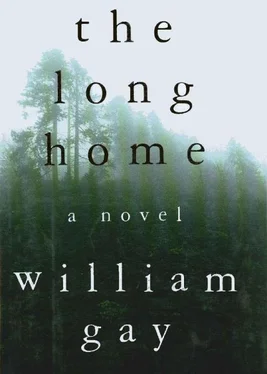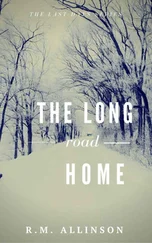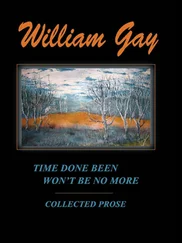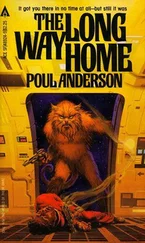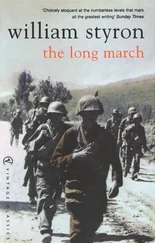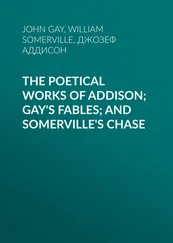Winer mentally chided himself for underestimating the reach of Huggin’s ambition. He washed the lather of his face and dried it on a towel. He wanted done with Huggins, wanted him gone, he felt constricted and short of breath as if Huggins somehow affected the atmosphere, sucked from it more than his due of oxygen, left it hot and lifeless and barren. He was fumbling out his wallet, thumbing through the money Hardin had paid him. “I guess I can.”
His alacrity took Huggins by surprise. He licked his already wet lips, eyeing the money. “Just let me have ten if you can spare it, good buddy. I’ll catch ye Wednesday.”
Winer paused. “If five’d do a minute ago how did we get up to ten?”
“Well. Five’ll do, I reckon. I’ll get by on it, I guess.”
Winer stood up. He reached Huggins the five-dollar bill, watched him fold it, palm it rapidly, and slide it into his watch-pocket, knew even as he watched that he would see it no more. “You’re going to have to get by on it,” he said. “I’m paying my own grocery ticket this week.”
“Do what?”
“I’ve been meaning all week to ask you about my grocery ticket out at Long’s. I’ve been sending money out there every week and somehow or other I seem to owe him more money all the time. Do you know how a thing like that could be?”
“Lord, no. I guess you better ask Sam Long. His tickets must be messed up.”
“His tickets are all right. Mines are the one messed up. What are you trying to pull on me.”
“You need to talk to your mama.”
“You say talk to Sam Long. Or talk to my mama. I’d about as soon talk to you as anybody I know.”
“I ain’t no bookkeeper.”
“No. You ain’t no bookkeeper. There’s two or three things I can think of that you are but you ain’t no bookkeeper. And I’ll tell you something. I work for my pay. And if you think I’m busting my ass every day so you can drink it up at the poolhall or pay for goddamn pots and pans then you’re living in a dreamworld.”
“You got a good bit of a mouth on ye for a youngen, ain’t ye?”
I’m going to hit him, Winer thought. Then he thought, no, I’d have to touch him.
“Boy, me and you’s goin to have to get somethin straight. Now, you work with me and I’ll work with ye, you make it hard on me and I’ll hand it right back to ye. Your mama thinks a right smart of me and we gettin purty serious. We might be gettin married one of these times, we might just all pick up and go north. Me and you’ll be in the same family then and you know as well as I do that a family ain’t got but one boss.”
“Why Goddamn you.” Winer dropped the razor and mirror, heard the clink of glass breaking on stone. He grasped the collar of Huggin’s shirt, twisted, felt the soft tug of thread breaking, the collar button pulling away. He kept the fabric between his fist and the white, hairless flesh of Huggin’s throat. “I’ll tell you right now,” Winer said. “What you and her do is your business. But it’ll be a cold day in hell when you boss me around.”
Huggins was walking awkwardly backward, trying to get away. He had thought Winer a boy, nothing to contend with, but he had never really looked at him. Now he was seeing the hard brown shoulders, the corded arms, and Winer watched fear rise up in Huggin’s eyes like liquid filling a glass, before it his own twinned image, the tiny faces cold and remote and malevolent, leaning into the back little eyes.
He released his grip and Huggins staggered backward, almost fell when a stone turned beneath his foot. He winced and stood massaging his ankle. “You stuckup little prick,” he said. “You sorry shitass.” He was breathing as if he had run a long way, a harsh, sucking rasp. He buttoned the shirt with what buttons remained and ran a shaking hand through his hair and went shambling back through the brush. When he judged himself safely out of reach he said, “We do get married the first thing I’m doin is puttin your ass on the road.” He went on.
Winer gathered up his gear again. The mirror lay in triangular shards, each reflecting its own blue sky or baring tree, a shattered glass landscape. He waited awhile until he heard the car start up and drive away before he went to the house. When he got there he saw that wherever Huggins had gone his mother had gone too.
His father had built the house, a man conscientious of the plumbness of corners, the pitch rafters. All these years had passed and the floorjoists were unsagging, the ceilings level and true. Would that other things had seen fit to endure so well. For the house smelled of waiting, of last year’s winter fires, it seemed to have been constructed solely in anticipation of some moment that had not arrived yet, or passed unnoticed long ago.
He drank a cup of coffee on the doorstep and after a while he went back in and he was surprised that so little time had passed. He turned the radio on. “From WJJD in Chicago,” the radio said. “Here’s Randy Blake with the Suppertime Frolic.” A song began, the scraping of a fiddle. He ascended the ladder into the attic.
When he descended with his toilet articles and a change of clothing in a brown paper bag the radio was singing, “I didn’t hear nobody pray, sweet Jesus, I didn’t hear nobody pray. Whiskey and blood run together, but I didn’t hear nobody pray.” Winer stood clutching the bag, staring about the room. He turned the radio off and went out.
He struck out across the field, following in the wake of the sun. The western sky was mottled red as if the town he moved toward lay in flames. Behind him at the wood’s edge darkness gathered, pursued him stealthily across the field. At its edge he paused uncertainly, sat for a time on a stone. He did not know for sure where he was going or even why he was going there. He laid the bag between his feet and sat with his hands clasped across his knees, staring back the way he had come. “Hellfire,” he said. “It’s my house.” He thought for a moment he might go back but he did not arise from the stone. A dull weight of anger seemed to hold him where he sat.
Dusk drew on, the dark stain of night seeping across the field. The sky turned a washedout lavender, darkened incrementally, a star came out. Another, pinpricks through the tapestry of night. Against the purple heavens the pinewoods turned oblique and foreign, took on the texture of flocked velvet. A chorus of whippoorwills arose, the steady onenote whirr of dryflies. The world of detail was vanishing, all the world he could see merging color and shape, changing, the horizon of trees dimensionless and dark against paler dark like pinchbeck trees stamped from tin.
He got up. He took up the bag and skirting the field followed an old near-lost wagonpath, came out from under the stoic and eyeless gaze of a scarecrow into a cornfield, passed through the stalks with the blades making dry sibilant whispers against his clothing. Faintly beyond the twisted stalks of corn he could see the blacktop highway like a moving river of ink. His faint shadow appeared like a spectral image. He turned and the moon hung poised over the spiked treeline. It was full and clouds shuttled across its remote face. They shifted constantly in the press of some high wind and against the yellow face they were near translucent so that the moon was an amorphous world in turmoil, seas and continents in perpetual flux, forming and reforming in patters eternally random. He came through the last of the corn and down an embankment and onto the blacktop. He went on toward town in silence save the hollow slap of his shoes on the pavement.
The wrecked Buick had been there as long as Winer could remember, a casualty of some forgotten accident. It sat below the tieyard slowly vanishing in a riotous sprouting of honeysuckle and kudzu as if the years had altered its chemistry, made it arable so that in summertime fireorange bells of cowitch bloomed from its quarter panels. He opened the front door against the gentle resistance of honeysuckle, threw the sack onto the floorboard. He closed the door soundlessly, peering across the car toward the lights of the shacks bordering the railroad tracks. Temporary looking, accidental houses hinting some connection with the traintracks, some misbegotten byproducts themselves of the trains coming and going. He walked past the dark bulks of stacked tires onto the street and went on toward town. A cur dog on a length of chain suspended from a clothesline followed him to the ends of its tether, the chain skirling on its clothesline faintly musical. When the line tautened the dog sat on its haunches and watched him go.
Читать дальше
